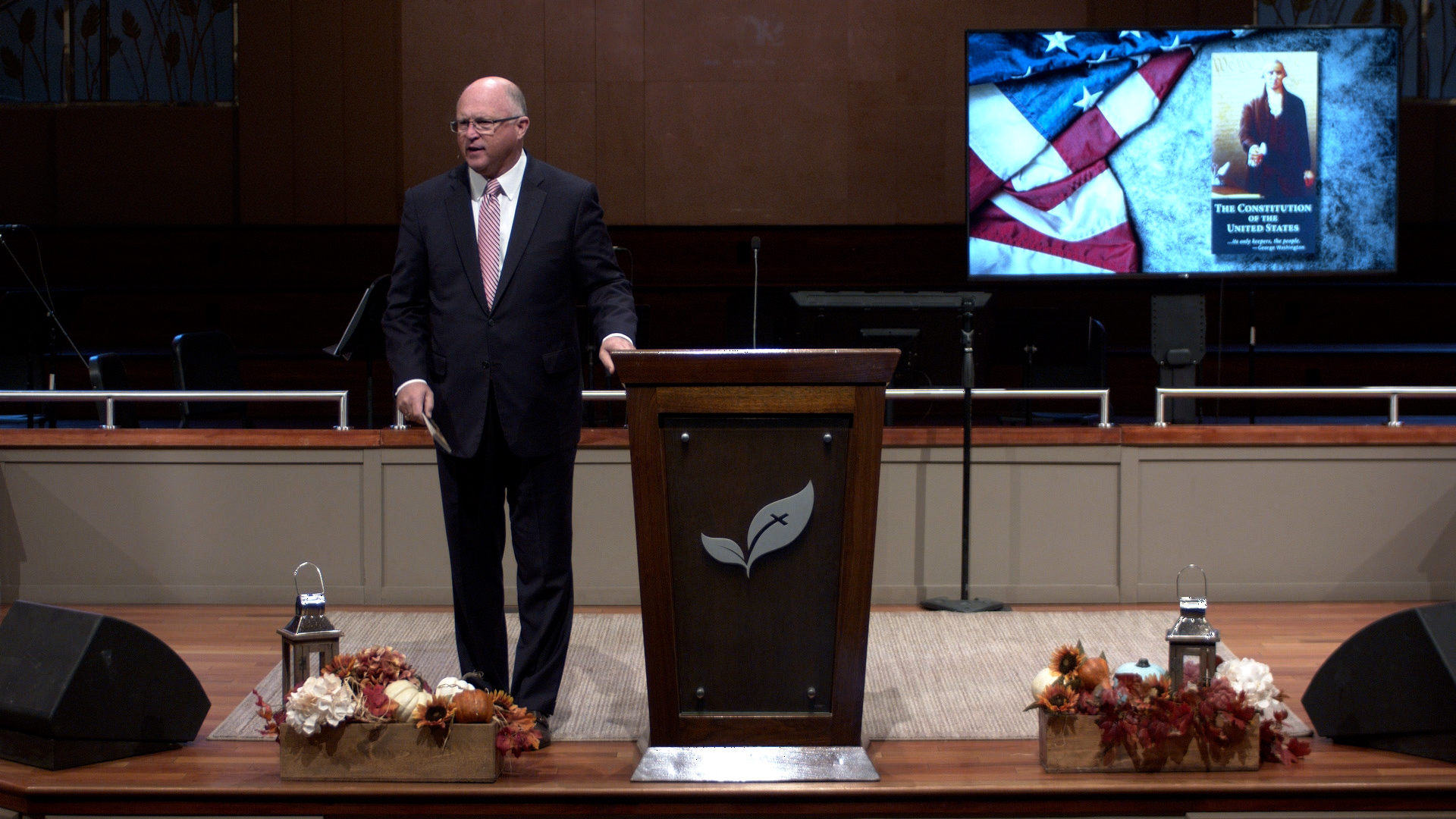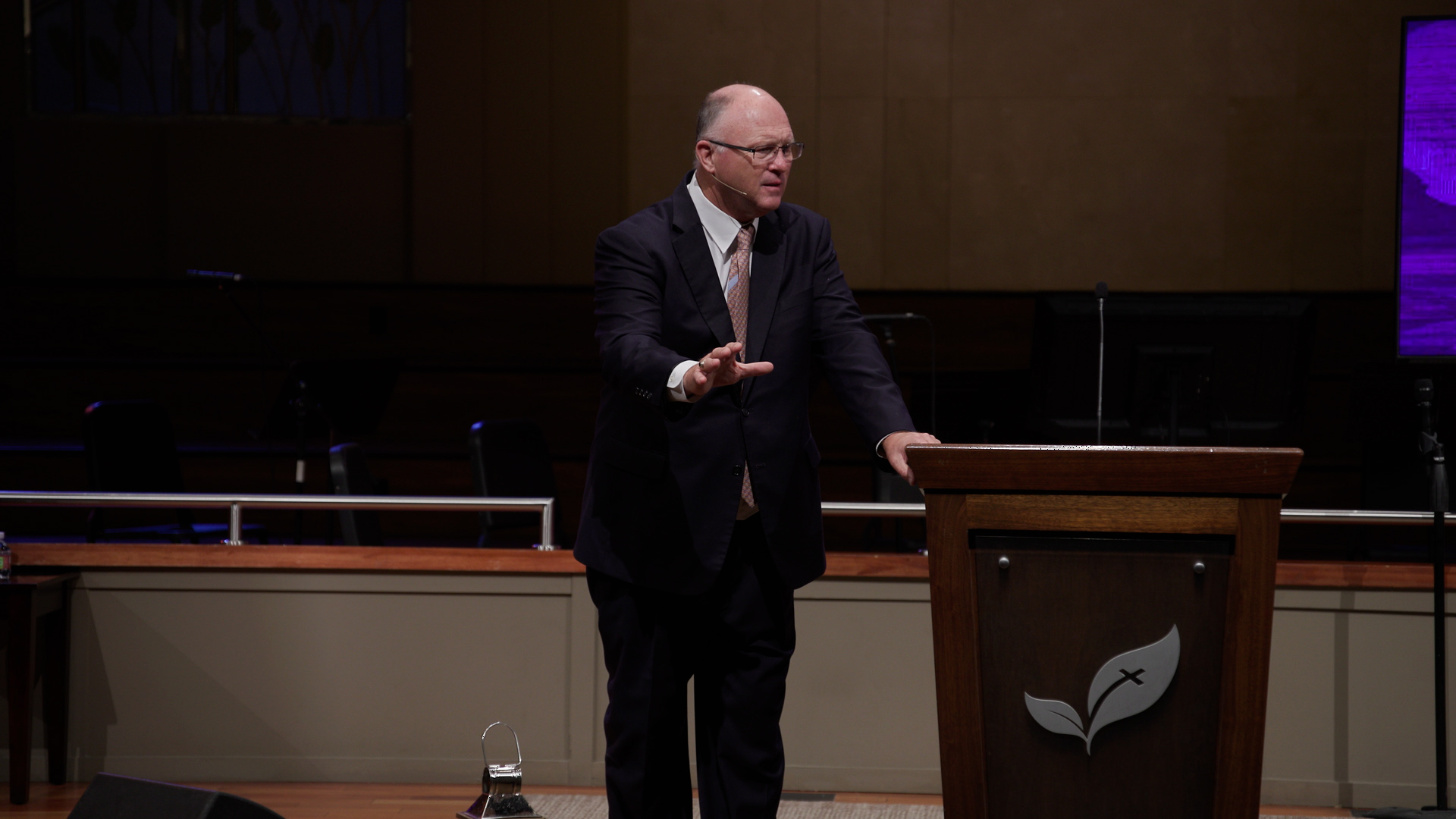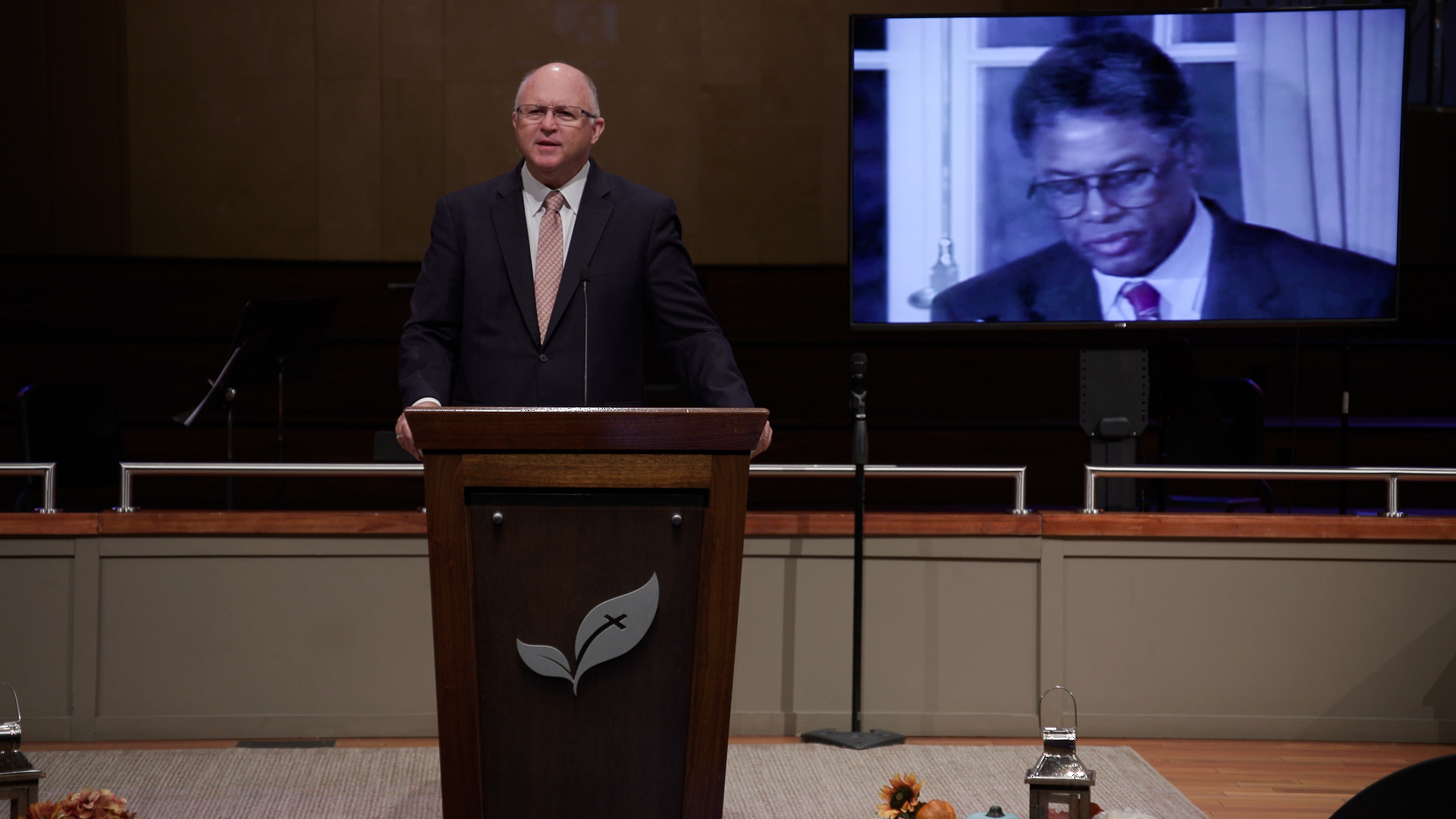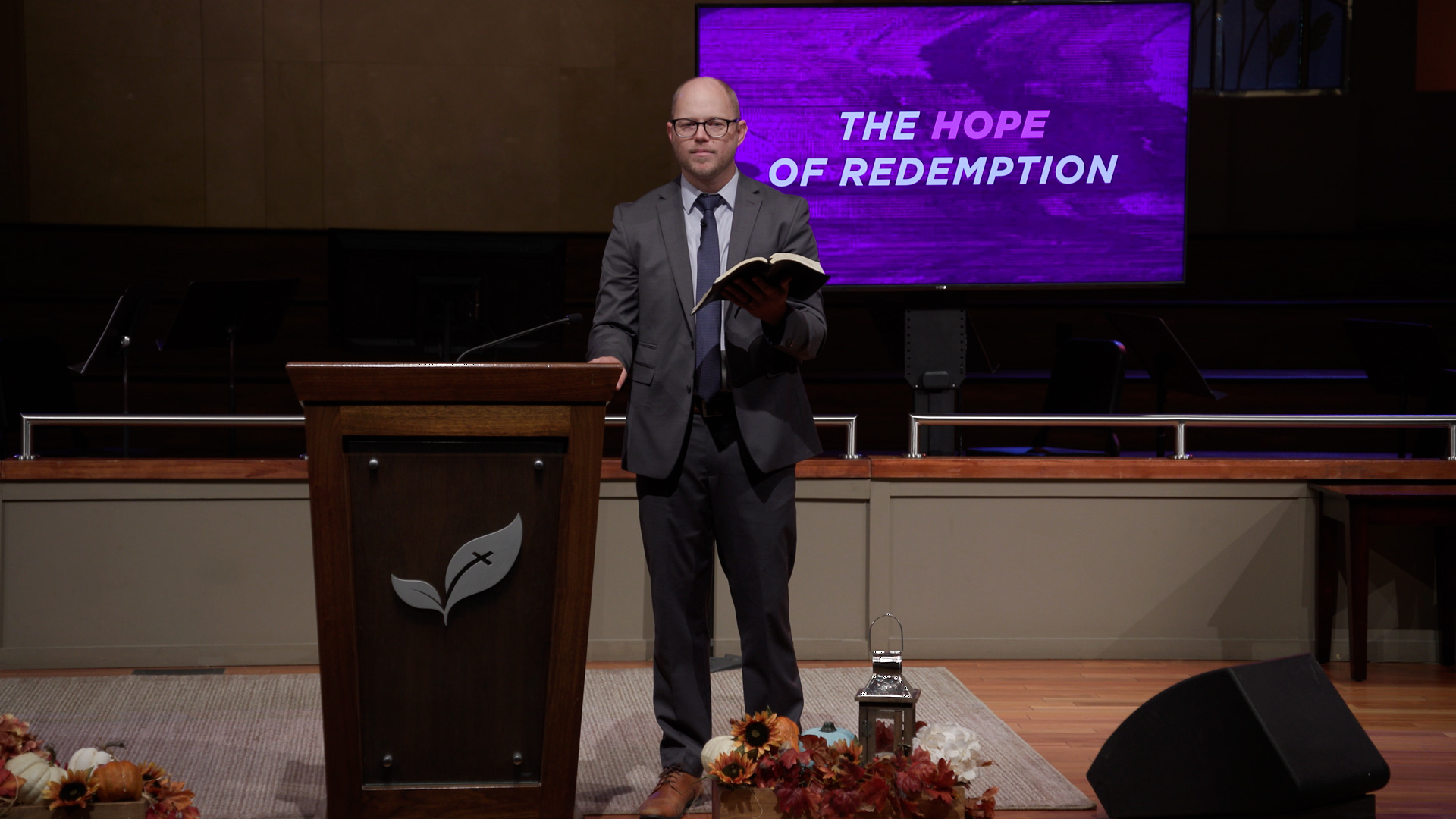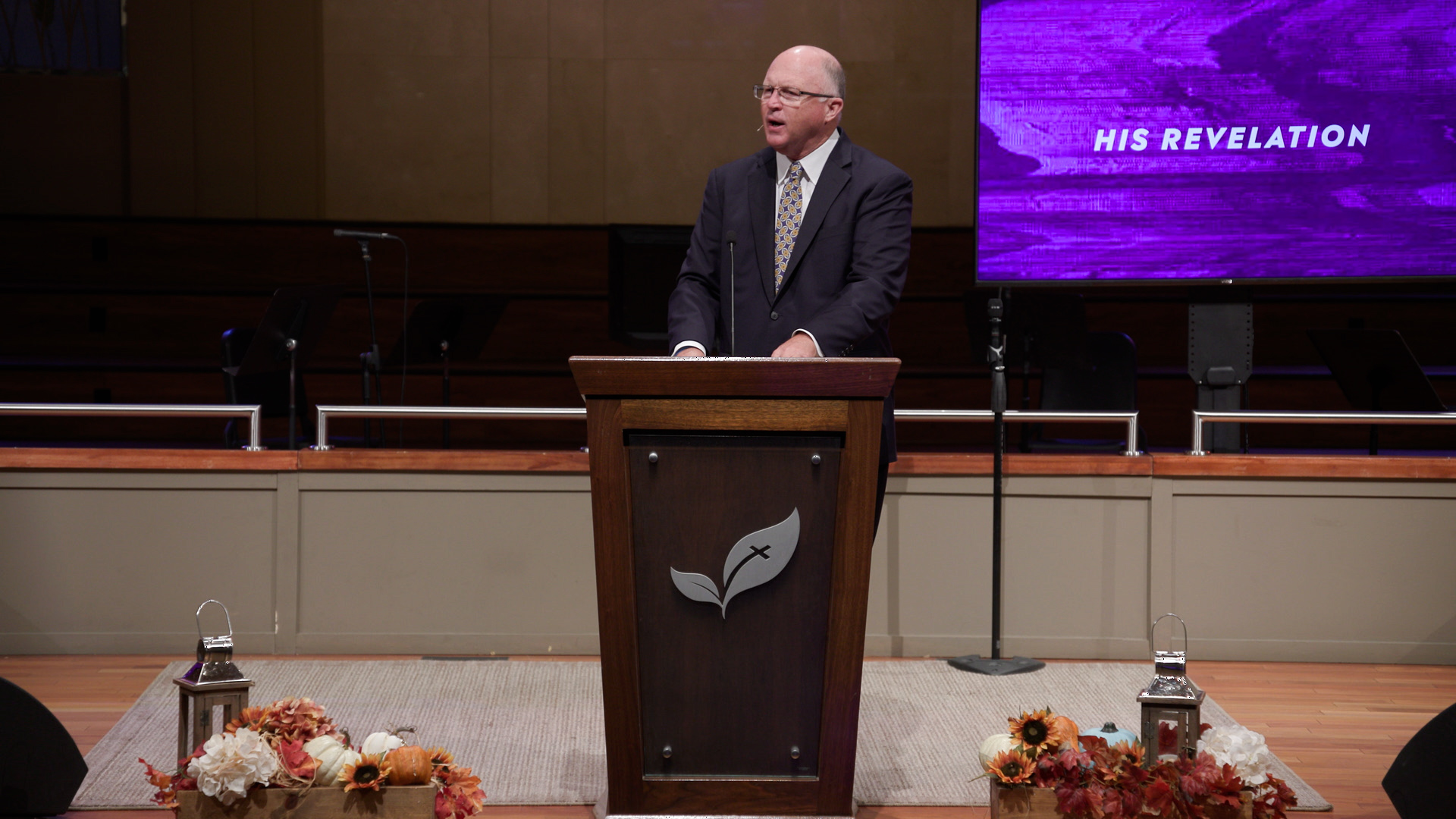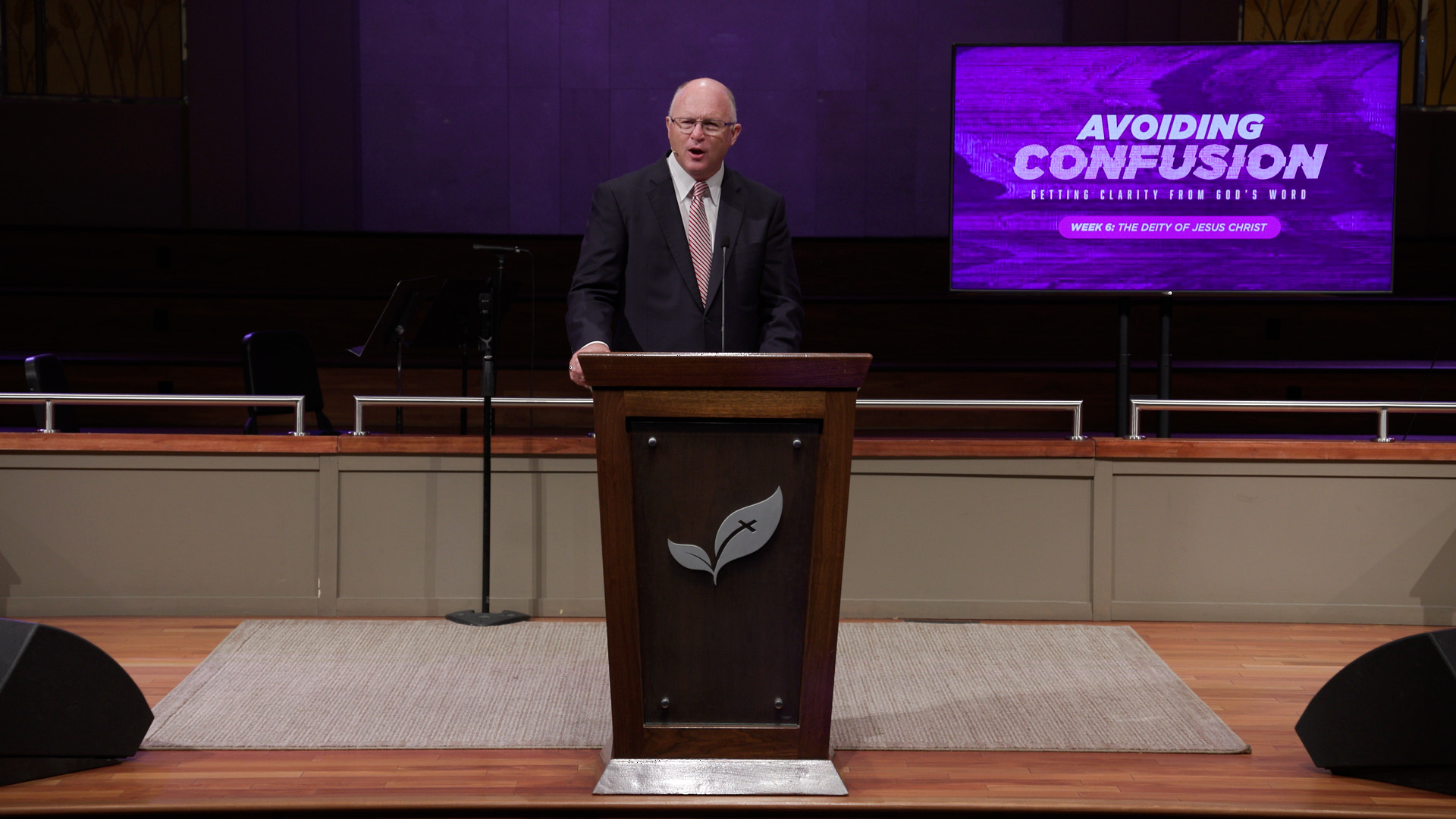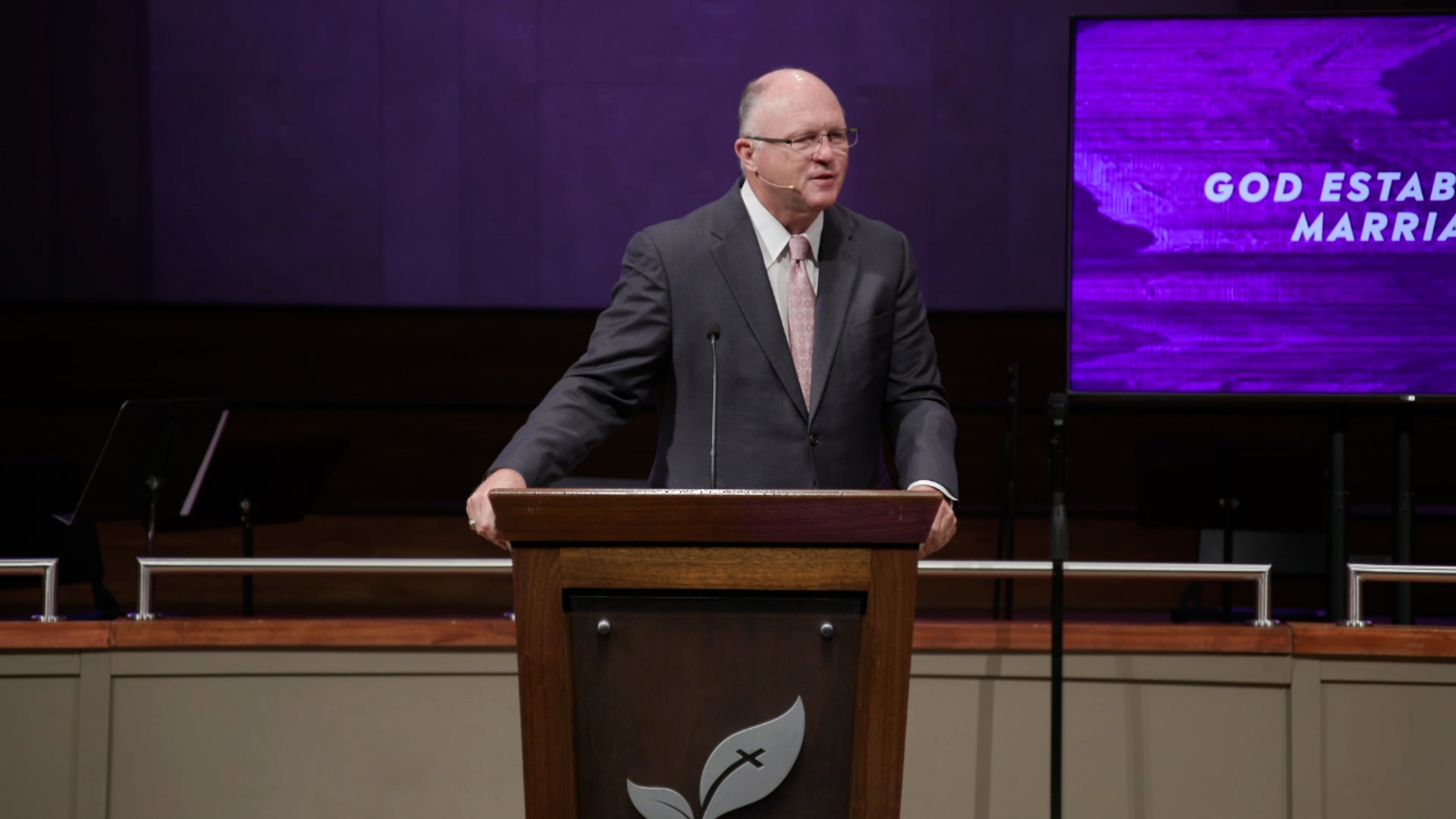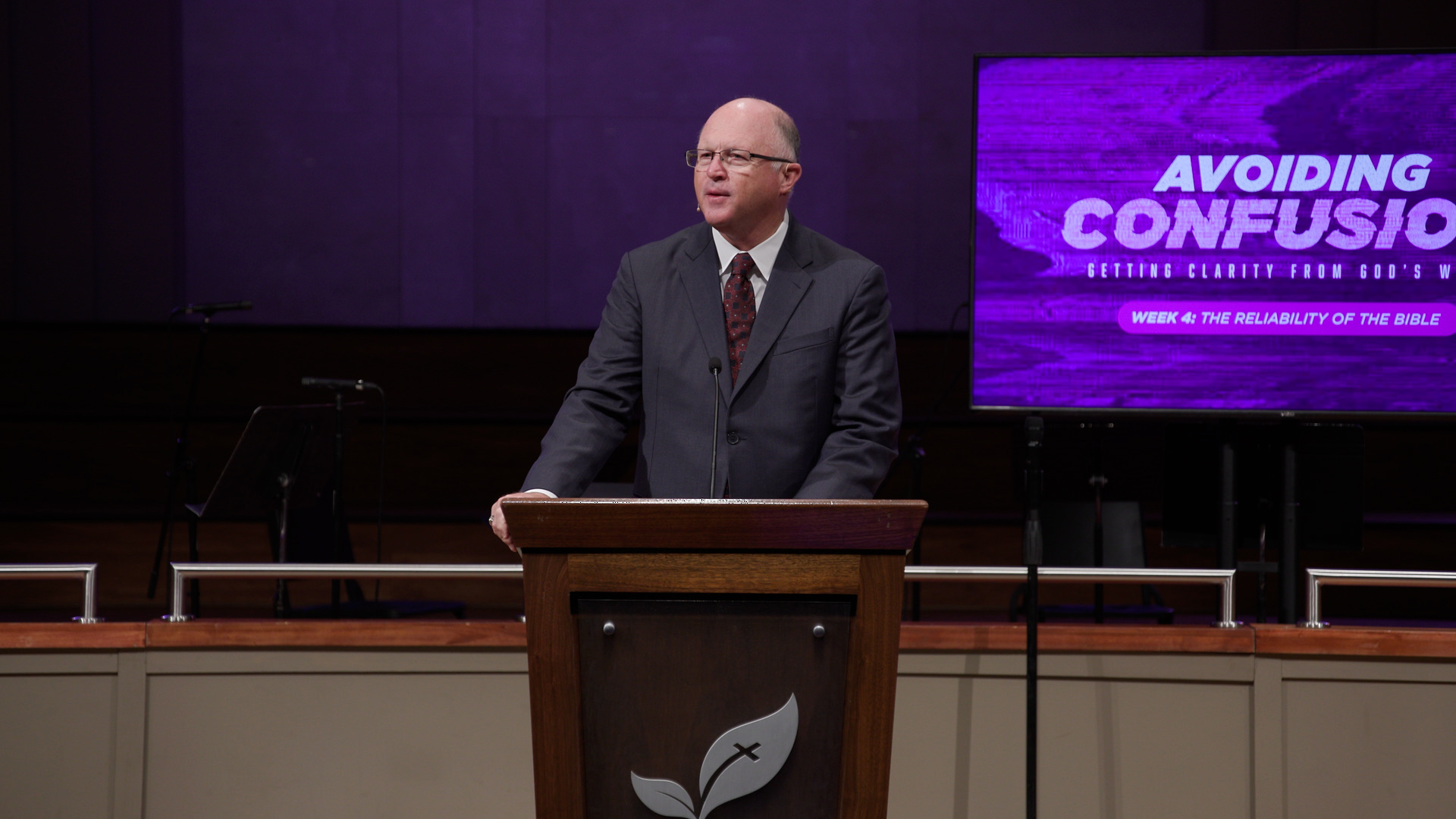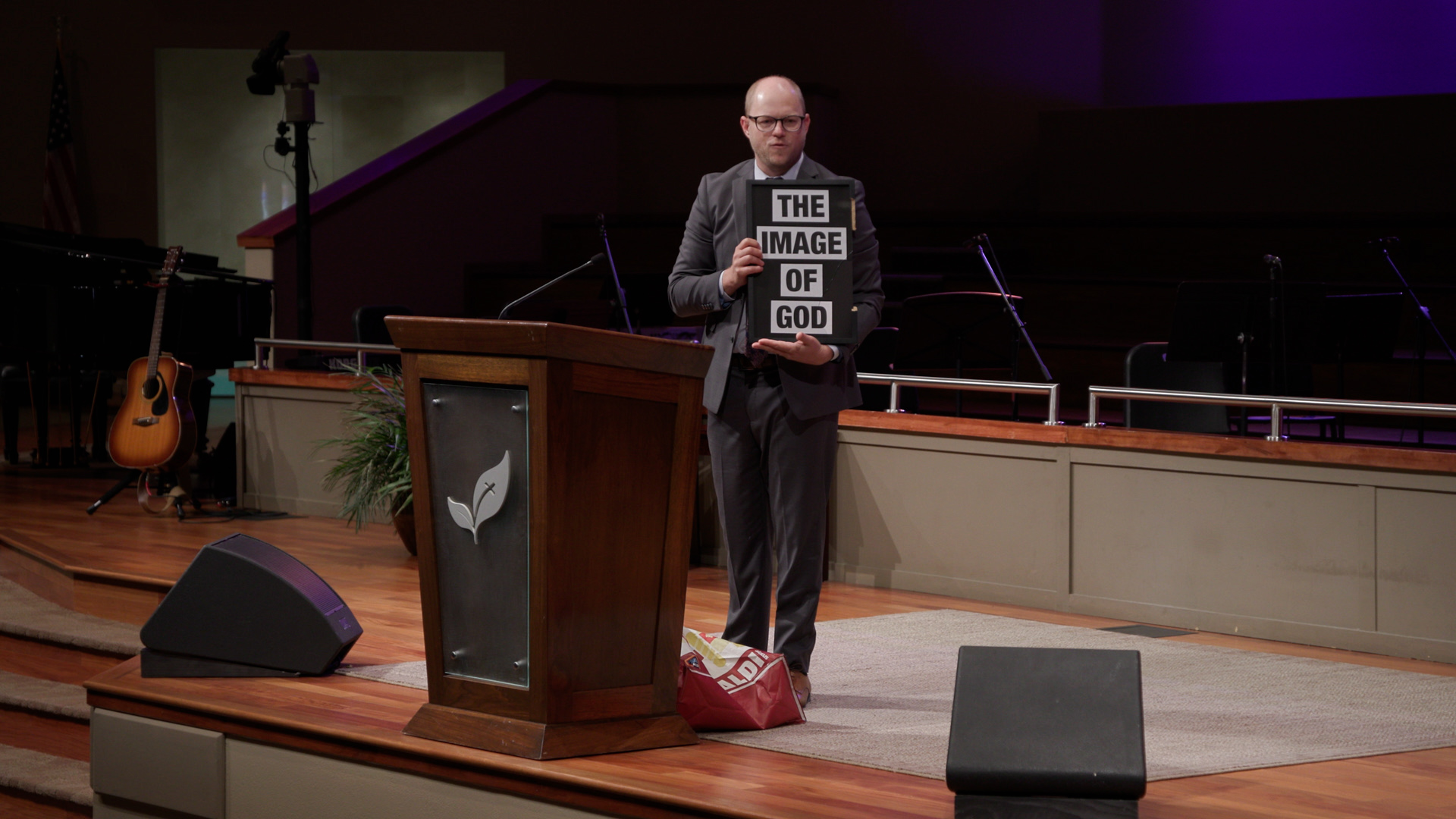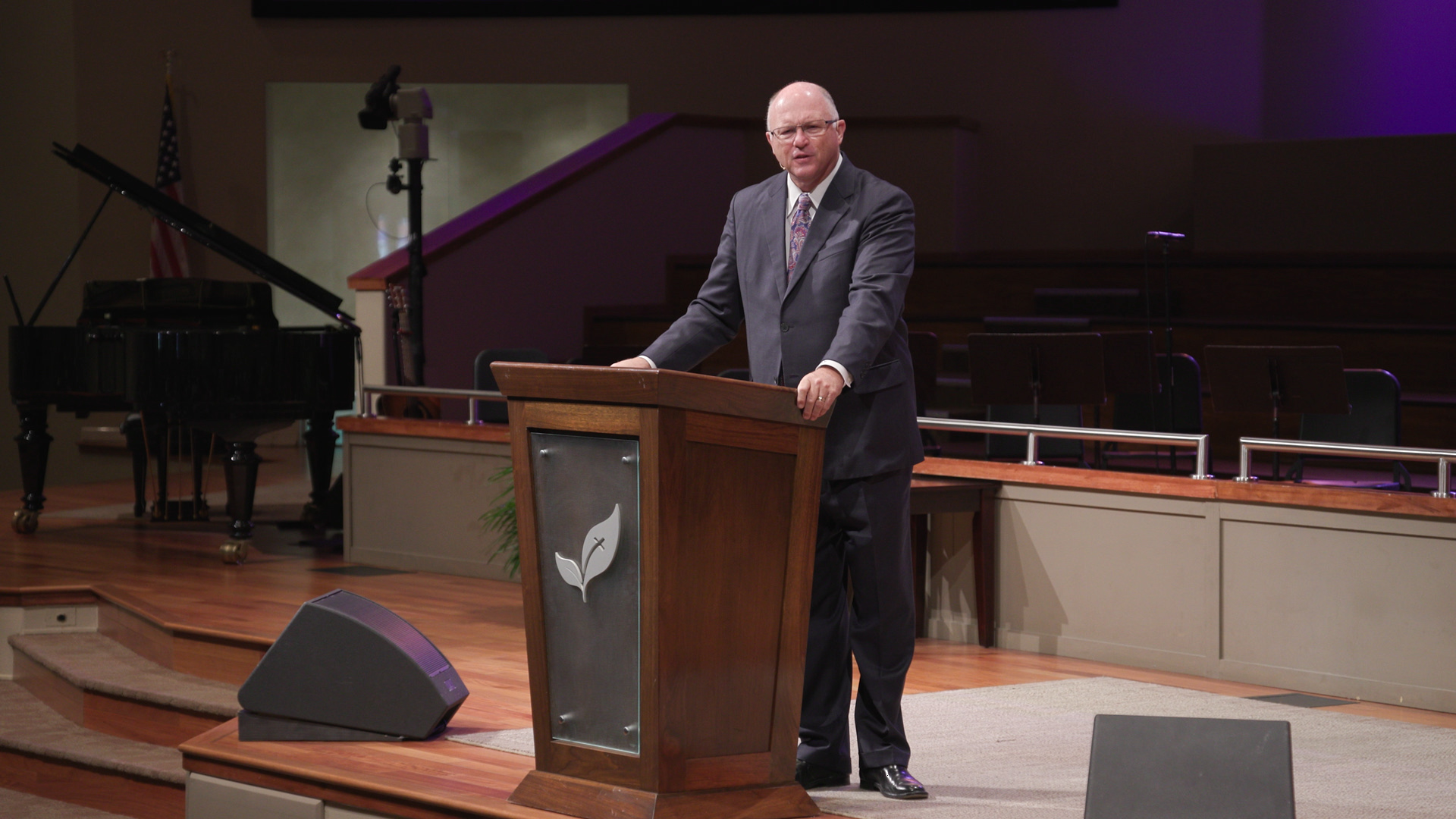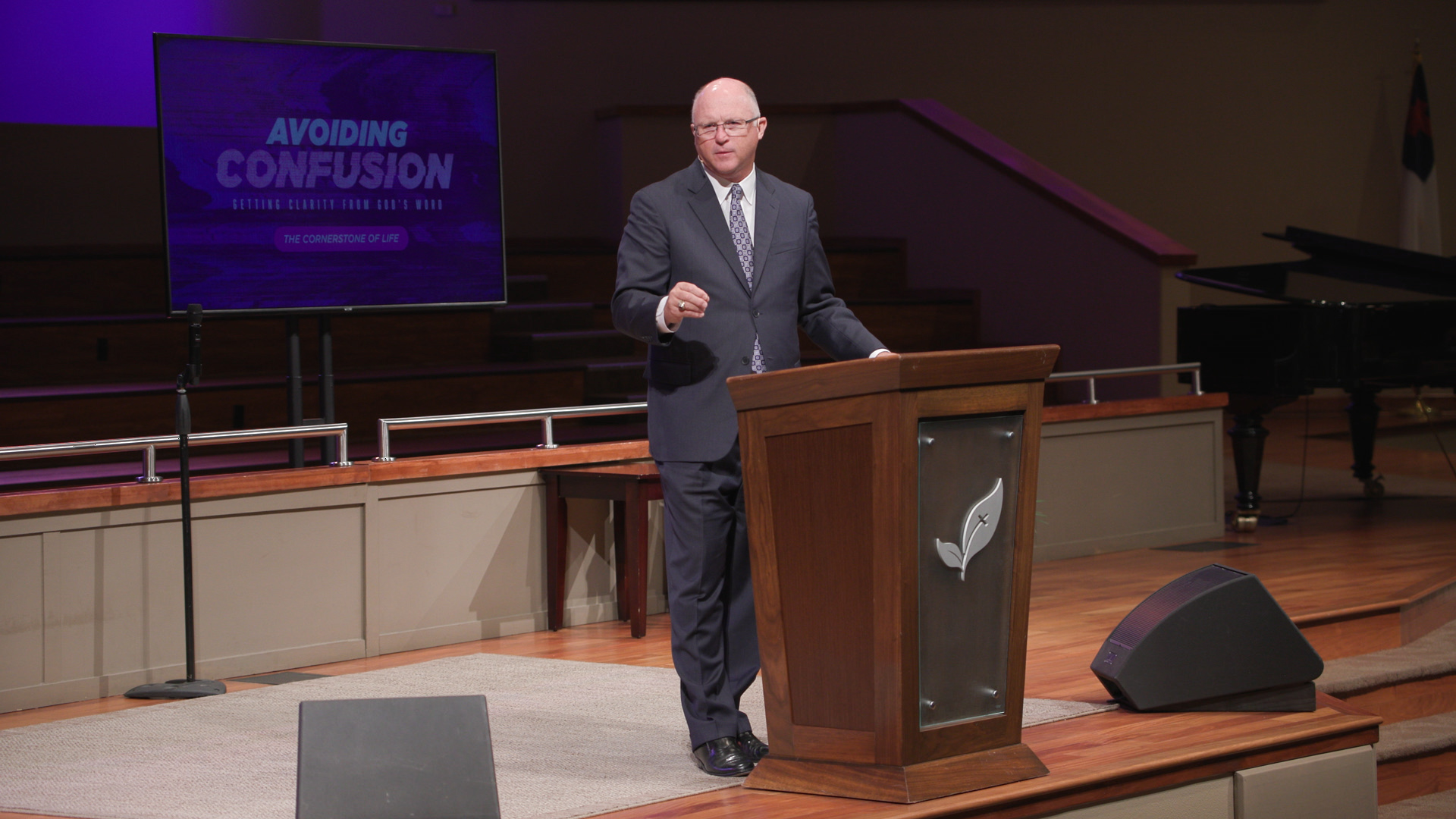Take your Bibles this morning, please; turn to Romans chapter 1 and to Genesis chapter 1. Romans chapter 1 and Genesis chapter 1. And if you are a guest with us, last week we began a brand new series entitled "Avoid the Confusion." Now there's a lot of confusion today about very important issues, ranging from God's existence to the origin of life to, "What is truth?" or "What is justice?" And we're going to be looking today at a tremendous topic, and that is "The Very Existence of God," because if there is no God, then all of the behavior we see in society is justifiable.
But if there is a God, then it makes a great difference in the conscience and the hearts of mankind. And I want you to study with me this morning this subject, "The Existence of God," as we continue this great series together. Let's stand together as we read in Genesis chapter 1, and we'll read just the first verse, and then we're going to read beginning in Romans chapter 1 and beginning in verse 18.
Genesis 1:1, let's read it together. Ready, begin: "In the beginning God created the heaven and the earth." Now we're going to preach a message in three or four weeks on creation because there's a lot of confusion about where we came from, and we want to see what the Bible says about that. But I want you to see those words in Genesis 1:1, "In the beginning God," right?
Now let's turn over to Romans chapter 1. And next week we have a great message prepared on the subject of life: "The Origin of Life" and "The Sanctity of Life." But today, "The Existence of God."
Romans 1:18, which says, "For the wrath of God is revealed from heaven against all ungodliness and unrighteousness of men, who hold the truth in unrighteousness; because that which may be known of God is manifest in them; for God hath shewed it unto them. For the invisible things of him from the creation of the world are clearly seen, being understood by the things that are made, even his essential power and Godhead; so that they are without excuse: because that, when they knew God, they glorified him not as God, neither were thankful; but became vain in their imaginations, and their foolish heart was darkened. Professing themselves to be wise, they became fools, and changed the glory of the uncorruptible God into an image made like to corruptible man, and to birds, and four-footed beasts, and creeping things." Let's pray and let's dive right into this great text today, shall we?
Father, we love you. We thank you that Jesus never fails. We thank you that we can worship you. We ask that you would give us wisdom as we are in a different moment in our country and in our world's history. We pray for protection and healing for those battling COVID. For those of our members that are watching online with underlying conditions, we pray for their protection. But we ask that your church would go forward through these days, that you would bless this time in your word, and that if there's someone here without Jesus in their life, that they would open their heart to you and be saved is our prayer, in Jesus' name. Amen. You may be seated.
Well, perhaps driving down the road you have seen that sticker that says, "Coexist." How many of you've ever seen this? Let me see. All right. You've seen this, this sticker "Coexist." And certainly in this great land of America there's a place for everybody. How many of you are thankful that we live in a free country today? And we're thankful that we have freedom of religion.
But there is a subtle message behind this sticker, isn't there? There's a subtle underlying message that seems to imply that all of these religions have an equal authority, and that they are all equally authoritative. And so the implication is that whether you're a Wiccan or whether you practice Taoism or Christianity or Buddhism, whatever, that they're all authoritatively about the same.
And, of course, we as Bible-believers know that there is a name that is above every name, and that is the name of the Lord Jesus Christ. That's why I've had our guys working on a new sticker, I'm going to put maybe on my car in the upcoming days, which simply says, "God exists," and it has the empty tomb to provide proof for the fact that there is a name that is above every name, and that at the grave of the founders of everyone of those other religions there are bones today. But outside of Jerusalem in the garden tomb there are no bones to be found because our Savior is a risen Savior. And so God exists. And today we want to open the Bible and we want to consider our God, how he has manifested himself, how the world rejects him still, and why that is important and has ramifications to the way people live their lives.
Now the Bible opens with a declarative statement about the existence of God. It simply says, "In the beginning God." The Bible does not defend the existence of God, it assumes his existence. Since God gave us the Bible it would be ridiculous then to start the book by trying to prove the existence of the author. I've written a number of book; I've never started the first page trying to defend the fact that I exist. It is understood that the author exists. "In the beginning God." That is the assumption of the first book of the Bible. We see God revealed, of course, in many ways. We see him revealed in his word, the Bible. We see him revealed in the person of his Son, the Lord Jesus Christ, who is equal in all of his attributes of deity. And we'll study in upcoming weeks the doctrine of the deity of Jesus Christ.
But this morning in Romans 1 I find three manifestations or revelations about the existence of God that I want to speak to you about this morning. I see in Romans 1 that there is an inward revelation, that there is an inward witness in the heart of every man to the fact that there is a God. And we're going to see that this morning, that within the heart of every man there's a knowledge of God.
Secondly, in this passage we're going to see that there is an outward revelation, that all around us creation screams and cries, testifies of the existence of God. And finally this morning we're going to see that there is a historical revelation, that God throughout history has revealed himself to man. It is documented, it is understood in the very fabric of our human race that there is a God.
Now our text this morning begins with the person and the personality of God. He is a God of love. How many of you are thankful for that? But Spurgeon said it this way: "God who is love is, first of all, light; therefore any thought of him being soft or indulgent toward sin must be put away." In other words, he is a God of love, he is a God of righteousness; and we see his righteousness in verse 18 of Romans chapter 1, where the Bible says, "For the wrath of God is revealed from heaven against all ungodliness and unrighteousness of men, who hold the truth in unrighteousness."
God sees men who have had the truth, but did not believe the truth. And the Bible predicts a wrath upon those who have known it, but have not received it. They denied his existence; and because of that, they feel that as if they believe there is no God, then there is no accountability to God, there is no judgment day with God. The way they deal with that issue is just simply to say, "There is no God, therefore I can live however I want to live." But God is going to say to them, "You are without excuse," and there will come a day of judgment upon them.
Now we saw last week a document called "The Humanist Manifesto." Some of you remember I spoke about Humanist Manifesto III, and the sub-caption of their manifesto, their motto is, "Good without God." They are good without God, the secular humanists say. And it's no surprise that the thousands of signers of Manifesto III are supportive and some are involved in the anarchist activities that we see today. They are supportive with respect to abortion. They are supportive with respect to various issues that are against the Bible, because when you sign a document that says, "I'm good without God," there's no moral restraint in your life, and you can live however you want to live.
That's one of the root problems in America today is there are too many people that are thinking they're good without God. How many of you would say, "It isn't all good from my perspective," amen? We need the Lord today. We need God in our lives guiding us and directing us each and every day. But their worldview is informed by a belief that denies the existence of God. And, church, this is why worldview is so important, because our worldview must be a biblical worldview if we are going to have the peace and the unity and the direction that God intended for our lives.
The decline of the Christian identity is particularly pronounced with young people in America today. Fully one-third of all Americans 35 years of age and under deny that there is a God or say that if there is, you cannot really know who he is from the standpoint of claiming either atheism or agnosticism. Many today define themselves as secular in their mindset, which refers to the fact that there is an absence of any binding theistic belief or authority in their life. To say that one is secular is really just a milder way of saying, "I'm an atheist, I'm a secularist, I do not believe in God."
And secularism is on the rise. In fact, this next chart will show you an interesting trend and a sad trend, and that is to say that 21 percent of these today in America are claiming either atheistic or agnostic as their belief; and that trend is rising with every year. And that's why I'm preaching this series because it is time for Christians to know what they believe and why they believe it, even about basic things like the existence of God. One in four church unchurched adults are skeptics, either atheists or agnostics today. Now skepticism, agnosticism, and atheism are not belief systems with which someone is born, these are belief systems that are chosen; and we're going to see why in just a moment.
I want you to notice the Bible tells us why God's wrath will be kindled against those who have rejected him. As we begin this morning, notice in verse 19, "Because that which may be known of God is manifest in them." Now this brings us, first of all, to the inward revelation. And these outlines are all available at lancasterbaptist.org if you want to go back and do some study, be sure to do that. Or you can pick them up Saturday night and bring them in with you on Sunday morning.
There is an inward revelation in the heart of men concerning the existence of God, and we see in verse 19 it is manifest in them. Sometimes we refer to this as innate truth, innate truth. Innate truth is that which belongs to something as part of its nature or constitution. It is something that is known inwardly. It is evident. In other words, God built into man the knowledge of the existence of himself. Now man does not always worship the true God, but there is something within every man that knows there is a God.
An atheist then is not born an atheist, but has become an atheist because either someone has fed him lies concerning God, or he has become angry because of something that happened in his life and has chosen not to believe in God. But atheism is not natural. It is not normal to deny the existence of any kind of a God. To deny the existence of God must be a deliberate volitional decision. It is innate within every man that there is a God. This is an innate truth.
Secondly, it is a unique intellect that God has given to man. He has given to man a unique intellect. Notice in verse 21 for a moment – we'll come back to these verses 19 and 20. But notice it says in verse 21, "Because that when they knew God, they glorified him not as God, neither were thankful; but became vain in their imaginations, and their foolish heart was darkened. Professing themselves to be wise, they became as fools." Now what we see in these verses is that man has been given an intellect with which he can make choices.
So here we see they knew God, but they chose not to believe in God. This was because they were created with the ability to choose. God created us with a volition with what sometimes is called a free will. I think of Genesis 1:26, "And God said, 'Let us make man in our' – what's that next word? – 'image, in our image, in our likeness, that he might have dominion over the fish of the sea and the fowl of the air.'" God said, "I'm going to create man with a unique intellect and ability to decide and to lead and to organize."
Now the very attempt to reason things out and make valued judgments presupposes the existence of God and the order of God who gave intellect to his creation. This intellect is a moral intellect; for the Bible says in verse 21, "When they knew God, they glorified him not as God, neither were thankful."
You see, without God, there is no moral meaning to life. So if someone rejects God it begins to show in the choices of their life. If someone believes in a higher power and a higher authority, they are going to show that in the way that they live as well. And oftentimes when you turn on the evening news you are seeing the result of decades of teaching from atheists who have taught their students that there is no God, and you are now seeing the results of a generation trained that there is no God; and it doesn't matter how you live. And this is why the church is essential because we must preach the existence of God and the influence of God that is needed in the life of every person and every great nation.
You see, the Bible tells us something very interesting about this intellect, this innate intellect. Romans 2:14 says, "For when the Gentiles, which have not the law, do by nature the things that are contained in the law," in other words, even nations and societies that do not understand, perhaps, the gospel or even the full ramifications of the Bible; yet there's something within them that realizes we need law and order to function as a society, and that comes from God. Even those that have no biblical law will still have a moral system. You cannot explain, for example, man's sense of right and wrong, good and evil, without concluding that a being who is perfect gave us this sense of right and wrong.
For example, law and order stems from a belief in God. Now that does not imply that everyone who speaks of law and order either knows Christ or fully knows all the Scriptures or is even a great Christian. But it implies this, that there is embedded within them an understanding that society cannot last without law and order; and that innate intellect is provided by a consciousness of God within their hearts. And you'll notice oftentimes there are those who are saying, "We don't want to have prayer in a public place. We don't want to have the name of God mentioned in a school or in this place." And so much of this comes from the denial of the existence of God.
Now the problem then for an atheist is that if he admits evil in the country, in the world, he must also admit that there is good in the world. And the tragic thing is that even some are now denying the existence of evil. Richard Dawkins, one of the famed atheists of our time, said in order to allow for his atheistic view he is denying now the existence of evil. He calls the belief in God a delusion. He knows that if he says there is evil, then there then must be good, and that would have to force him to look at the source of good which is God himself. So some are even saying, "There's no good, there's no evil. There's a relativism in the approach to how it is all viewed as coming to God and seeking his direction for their life.
There's a moral intellect, but there's also a moral purpose that God has given to man. The Bible tells us that these who reject God miss that purpose, verse 22: "They profess themselves to be wise, and they become fools. And they change the glory of the uncorruptible God into an image made like corruptible man."
If you've ever visited – and this passage deals with the ancient Greek world and the Roman world, and if you ever visit some of the sites of the ancient Greek world, like the city of Ephesus for example, you'll find many of the gods that are there are animals that are made of stone; but they are worshiped. And you'll find that there is the worship of the moon and the sun. And they have turned these objects into their gods, which is evidence of their rejection of the true God.
And so we see that there is a moral purpose that is missed, because man says, "I'm wise," but God says, "You're a fool." In fact, the Bible says, "The fool hath said in his heart there is no God." You see, God has placed within every man a desire for purpose, a desire for a greater purpose.
I believe it was the Westminster Catechism that first asked the question, "What is the chief end of man?" And man's chief end is to glorify God and to enjoy him forever. Whatever you do, do it all to the glory of God. And God has given us the ability intellectually to understand that there's a greater purpose in life than living for self, living as a fool. But we can live for God Almighty. And this is an inward revelation. God has revealed it to man that that which may be known of God is manifest in them.
And I want to encourage you when you witness to friends and talk to others about Jesus, while they may put up a wall of rejection, the fact is that within them there's a curiosity about God. There's an emptiness without God. There's an inner witness that is convicting them, the Holy Spirit, to bring them to God. And so may we be faithful in this hour. There is an inward revelation of God; and, oh, how we thank God for that. In fact, the Bible says regarding the work of the Holy Ghost that he witnesseth in every city. He's witnessing into the inner heart of a man, drawing them to Jesus Christ.
But notice, secondly, there's an outward revelation. We see an inward revelation; we see also an outward revelation in verse 20. Notice, please, "For the invisible things of him from the creation of the world are clearly seen, being understood by the things that are made, even his eternal power and Godhead; that they are without excuse," speaking again of those who reject God. They're without excuse. Why? Because the things that God has created are a wonderful testimony to the very power of our God, the invisible things of him from creation of the world. The heavens declare the glory of God.
Now as we think about this I want you to think about this outward revelation in two terms. First, I want you to think of it with respect to the revelation of cause, and I speak here of cause and effect. Every effect must have an adequate cause. The universe is, for example, an effect. Reason demands that whatever cause the universe must be greater than the universe. That cause is God who himself is the uncaused cause. He is eternally preexistent, all-powerful God who created the world. Remember, "In the beginning God created." And so, concrete reality around us owes its being to something else, to something greater; and the cause is Almighty God.
Now I think about this, and in many ways you can illustrate it. I think about the apple today, and I think about this apple on the screen or this apple in my hand, and when I think about something simple like this piece of fruit it reminds me of the fact that the apple did not bring itself into being. This apple did not just appear. The fact of the matter is that a tree preexisted this apple, and that the reason that we have the apple is because we have the apple tree; the tree does not explain its own existence. And if you go back across all of the physical causes, you cannot have an infinite series of causes, you must at some point have a beginning, and the beginning is God: "In the beginning God." And so the natural life around us, the beauty of creation around us reminds us that, yes, we see the effect. But the initial cause was the very word of God.
And there must be one self-existent cause: "In the beginning God." The Moody Bible Handbook describes this beautifully when it says, "The term 'cosmological' comes from the Greek word 'cosmos' meaning world. This argument is based on the fact that a cosmos or world exists, because something cannot come from nothing, there must be an original cause that is the reason for the world's existence. A man wears a wristwatch. Although he has never seen a watchmaker, the fact of the existence of the wristwatch suggests that there is a watchmaker who made the watch. The cosmological argument says that every effect must have a cause."
Now the fact is that scientists can speculate, and they do; but all they really can do is theorize about what happened after their big bang. And it's interesting to me to hear them talk about their thoughts and ideas. One particular scientist, Steven Weinberg who is a Nobel Prize-winning physicist, said, "In the beginning there was an explosion." That's his description of the beginning of the world: the big bang. And when you follow the logic of that particular theory, what man is saying is that we are all molecules in motion, we are here by the accident of a bang that took place billions of years ago, that's all there is.
But the fact is that God says he has placed us here for a purpose, and that we are more than moving molecules. We are his creation with a specific purpose. And so we see the revelation of cause where we see an effect. There is a cause, and we choose to believe it is not a big bang, it is our big God. And I would suggest it takes more faith to believe in the accident of a big bang than it does in the reality of our God. And so, there is the revelation of cause.
But I want you to notice, secondly, there is the revelation of creation. Now we mentioned this a moment ago: creation, verse 20. The Bible speaks of it. It says, "The creation of the world is clearly seen." May I say this morning that God's signature is all over his creation. When you stop and view the Grand Canyon, the Rocky Mountains, the Swiss Alps, the great Pacific Ocean, when you see the beauty of this creation, it causes us to recognize there is a power so much greater than accident, power so much greater than man's ingenuity; and we see that this creation had order.
The Bible says that, "God created." That is to speak of his institution or ordinance to bring to pass this that did not previously exist. And the Bible tells us in 1 Corinthians 14:40, "Let all things be done decently and in order." And that was the plan of God. Psalm 119:89, "Forever, O Lord, thy word is settled in heaven." By the way, how many of you are thankful for that?
Congregation: Amen.
"Thy faithfulness is unto all generations; thou hast established the earth, and it abideth." And so we see in God's creation an order. We see, secondly, it shows us a designer.
Now a moment ago I read to you from the Moody Bible Handbook this illustration of a watch. And I want you to think about that for a moment. If you were to take all of the contents of a watch and just throw them, the springs, and all of the hands, and all of these things into a box, and if you then were to just shake that box up and just shake it as much as you possibly could, you are not going to open that box and find a finely assembled Bulova watch or whatever kind of watch inside the box. But that is exactly what modern-day brilliant so-called scientists are telling us is what happened is that somehow this ordered universe in which we live came about by an explosion, by a shaking, and suddenly boom, here were the planets, here was the earth, here were the galaxies orbiting around one another in order.
What we are saying here this morning is that this creation shows us that there is a designer and that the design has a designer, and that if we had a beginning, we had a beginner, and you can see God in his creation. Psalm 19:1, "And the heavens declare the glory of God; and the firmament sheweth his handywork. Day unto day uttereth speech, and night unto night sheweth knowledge. There is no speech nor language, where their voice is not heard." O, the heavens declare the glory of our God, so that the Bible says in verse 20, "They are without excuse." Why? Because there's an inward revelation.
There's a voice that speaks to them concerning the fact there is a God, there is a purpose in this life because there is an outward revelation all around them telling them that there is an effect, but then there must be a cause. And there is a grandeur and there is a beauty, there is a design; then there must be a designer to this design. And so we speak concerning the existence of God based upon the inward revelation, based upon the outward revelation. But I want you to notice finally this morning the historical revelation of God. There is a historical revelation of our God.
Notice again in verse 21 it says, "Because that, when they knew God." Now sometimes when you witness, people will say, "I just don't believe in a God that would send someone to hell who has never heard about him." Now we've already established that God has placed within the innate intellect of every individual the understanding that there is a God. But I want you to think back into history for just a moment because there are at least two times in all of the world's history where every inhabitant of planet earth knew the plan of God for their life.
First was in the very beginning with Adam and Eve. God revealed his plan for fellowship. God revealed his plan to them. And even after they broke that fellowship in sin, he revealed his plan of redemption through the shedding of the blood of an innocent lamb. And yet throughout his revelation to that early family, there was a rebellion, there was a rejection, bringing us to the time of Noah. And it was during the time of Noah once again when God saw that men constantly thought only evil and wicked thoughts; and he destroyed the world. But there was a family that was spared, and in that family is a testimony that everyone alive on planet earth knew the plan of God. And yet no sooner did they come out of that ark, then the sinful habits of man began to be displayed once again, and a rejection of the revelation of God even in Noah's own family.
The fact is that historically God has revealed himself to this human race, and this human race has rejected him time and time again. How many of you sometimes are amazed at the mercy of God towards this human race? I am, that he is so patient and loving and merciful towards us.
But in past cultures we see this: "When they knew God." I think about the Greek and Roman Empires, and I mentioned the idolatry of those empires; and we know of the great persecution upon the church made by the hands of the Romans. But thinking even before that, think, if you would, back to Noah, who I mentioned ago. All those who lived up to Noah knew the truth about God, but they turned away from him into sinful living.
I think of Noah's father Lamech. Noah's father would have lived and walked even with Adam. There was a closer lineage of understanding of the revelation of God by those early antediluvian families. Nevertheless, they rejected the very One that had created them. The Bible says in Genesis 6:5, "And God saw that the wickedness of man was great in the earth, and that every imagination of the thoughts of his heart was only evil continually."
We seen then that in history God revealed himself to this people. Noah went about for decades preaching the truth: preaching the truth of God, preaching the truth of rain and judgment to come. But he was, in that culture, in that generation, rejected of men.
I think of Israel, how that time and again, God warned them, and he said, "All around you are false gods, and all around you are a people who worship false gods and lift up the altars of Baal. But time and again, though they knew God, though they knew him innately, though they knew him through revelation, they chose to reject him. They turned to idols and were judged by being dispersed and taken into captivity because they rejected him.
And by the way, God is no respecter of persons. And as this country turns away from God, there is a judgment day coming – you mark that down. Our only hope in America is to turn back to God!
Congregation: Amen.
Isaiah 1:4, speaking to the children of Israel, "Ah sinful nation, a people laden with iniquity, a seed of evildoers, children that are corrupters: they have forsaken the Lord, they have provoked the Holy One of Israel unto anger, they are gone away backward." Verse 9, "Except the Lord of hosts had left unto us a very small remnant, we should have been as Sodom, and we would have been like unto Gomorrah."
Time does not permit to go to culture after culture after culture that has seen the revelation of God, had heard the gospel of Jesus, and has turned completely and entirely away from it. You can go to some of the great names of wickedness, if there is such a description, throughout world history, and you will find that many of these great persecutors of the church at one time knew about God. They attended Sunday School. Some of the great dictators of communism had a knowledge of God, but they put it away, and their life became a life filled with wickedness.
I think of the present culture in which we live. Notice in verse 21 it says, "But when they knew God, they glorified him not as God, neither were thankful." G. K. Chesterton said, "When men choose not to believe in God, they do not thereafter believe in nothing. They then become capable of believing in anything. When men choose not to believe in God, they do not thereafter believe in nothing. They then become capable of believing in anything." And some of the things that people run to – their Eastern meditation, worshiping rocks, turning to some type of satanic cults or wiccan worship. Why do they turn to such fallacies? Because their heart is hardened to Almighty God, you see. And we see it in the past cultures, we see it in the present cultures.
The Bible says in verse 22, "Professing themselves to be wise." "Oh, we're so wise we don't need God. We'll even sign the Humanist Manifesto that we are our own gods, that with our intellect we don't need God." The Bible is very clear, however, "The fear of the Lord is the beginning of wisdom." Proverbs 1:7, say it with me: "The fear of the Lord is the beginning of knowledge."
Anytime I see a church, a family, or a nation that is lacking in its fear of God, I get concerned. By the way, to the contrary: whenever I see any sign of our nation showing reverence to God, I get encouraged. People were so angry at the referencing of God this past week sometimes in the media. Listen, when I hear the name of my Lord spoken of with respect in a public place it encourages my heart. I just have a clip of the prayer of Franklin Graham last week at the White House, I want you to hear it.
Video Clip: "Let us pray. Our heavenly Father, which art in heaven, we thank you for the great bounty you have bestowed on this nation and the many blessings we have received these past four years. And we pray this in the mighty name of your Son, my Lord and Savior Jesus Christ. Amen.
Now when you hear someone stand and proclaim the name of the Lord – and they may not agree with every jot and tittle of your particular way. But may I just tell you something this morning? We ought to thank God whenever his name is reverenced in this culture. And we ought to take note of the fact that there are times when his name is completely dismissed. In fact, some who want to give a pledge to our flag by removing the names "under God."
And what I'm helping you to understand this morning, I pray by the grace of God is that our culture today, though we have this revelation of God, though we have preaching and Bibles, and though we've had strong churches in our nation, there is a turning away from God. And, in fact, even this evangelist and other Christians as they left the lawn of the White House a few nights ago, were jeered and were cursed and were pushed and were shoved because of their faith, many times their faith in Jesus Christ and their belief in God. And what I want us to realize as Christians: it's time that we would rise up without fear and without apology and say, "I too believe in the Lord Jesus Christ. I believe in the name of God. And I'm thankful that he is my God."
Our society is distancing from Christian theism as the fundamental explanation of our world and of the moral structure of our human society. This is why modern-day anarchists promote the queer family and burn the Bible, and this is why they want to change even the very titles mother and father. And in France recently, they voted to change the terms from mother and father to Parent 1 and Parent 2, in order that they might be able to please this crowd that denies God and denies the Bible; and in turn, it's going to ruin their family, and ultimately ruin their nation.
And by the way, what happens when a nation rejects belief in God? Well, notice in verse 24, the Bible says – and just to synopsize here, here is some of the response. It says, "Wherefore God also gave them up unto uncleanness through the lusts of their own hearts." Notice in verse 26, "For this cause God gave them up unto vile affections." Verse 28, "God gave them over to a reprobate mind."
I don't know when that point is in a person's life, in a nation's life. But apparently with these past cultures – and I believe we're flirting with danger in this present culture – there comes a point when God says, "All right, that's what you want, you can have it; it's going to be to your own destruction." And ladies and gentlemen, it has happened before in history.
I remember walking through the prison camps at Dachau in Germany. I remember as I saw there the various torture chambers, the gas chamber where Hitler would take people in telling them they were going to have a shower or a bath walking them into that room, and then laying those dear Jewish people down into the incinerator and piling their bones out back like they were some type of refuse. I remember seeing the sign of Adolf Hitler posted over the top of the entryway, "We want to raise a generation of men void of conscience."
How can people come to such depravity? How can they do such things to their fellow citizens? How can they take life without even thinking about it? I will tell you how it is done: it is done when anything or anyone else replaces the position of God in their life. Their idolatry, their hatred for the Jewish people brought them to the most despicable actions known to man. Isaiah 5:20 says, "Woe unto them that call evil good, and good evil; that put darkness for light, and light for darkness; that put bitter for sweet, and sweet for bitter!"
People that are murdering in our streets and people that are destroying private property and saying, "This is a good thing," people that are stealing from stores and saying, "This is our reparations," ladies and gentlemen, this is the sign of a people who need the Lord desperately because they're calling evil good and good evil. And people are ethically empty. They are losing their identity because they do not know God. And we are seeing our nation progressively becoming more and more de-Christianized.
And may I say to you: there is no hope in atheism. They are without excuse, according to God's word. There is an inner revelation, an outer revelation, a historical revelation that says, "You are wrong about God, and you're getting it wrong about life, and you will get it wrong about eternal life, because the wages of sin is death, but the gift of God can only be found through the Lord Jesus Christ." Hebrews 9 is still in the Bible. It says very clearly, "And as it is appointed unto men once to die, and after this the judgment."
By the way, don't get in the mindset of, "Well, how does God let all this happen?" Listen, there will come a day of reckoning, my friend. God says there will come a day of judgment.
O friend, there is a God. You can turn to him this morning in repentance and trust his Son Jesus Christ. Hebrews 11:6 tells us, "But without faith it is impossible to please him: for he that cometh to God must believe that he is, and that he is a rewarder of those that diligently seek him."
Oh, the thing that comes to my heart this morning in such great convicting power is not only that there is a God, but that there is a God that loves me. There is a God so great that he speaks this world into existence. There is a God so great that he brings judgment upon the world in love in order that redemption might come through Noah. There is a God that has such power; and yet he knows me and he knows you individually. "He that believeth on the Son," John said, "he that believeth on the Son hath everlasting life, and he that believeth not the Son shall not see life; but the wrath of God abideth in him."
Yes, there is a God who will judge. There is a God who has a place of eternal wrath. But that same God is a God of love. He is a God who has made a way of escape. He is a God that has a home in heaven for you. God does not want any to perish: "He's not willing that any should perish, but that all should come to repentance." What a loving God we serve. Heard of a mom recently that said to her five-year-old son, "I am losing my mind." And he looked at her and said, "Mom, whatever you do, don't lose your heart, because I'm in there."
Friend, this morning you are in God's heart. This great, creative, powerful God so loved the world, that he gave his only begotten Son, that whosoever believeth in him should not perish but have everlasting life. What a wonderful God we serve. If you don't know him, I want to encourage you this morning: come to him. Come to his forgiving Son. Find redemption in the blood that was shed in the power of the resurrection. Come to God today. And if you claim to be a Christian, but you've been marching to the beat of this world's drum, then come back to the Bible. Get a biblical worldview. Join us on this journey of study. Avoid the confusion in our culture by getting into the Bible.
O friend, we must allow God's word to align our direction as we worship and serve our God, because there is an inner revelation, an outer revelation, and a historical revelation, and a biblical revelation, and a Christological revelation. And I cannot reject God's wooing of me. I must follow the One that has revealed himself to me. And I pray that you will do that this week as well.
[End of Audio]

